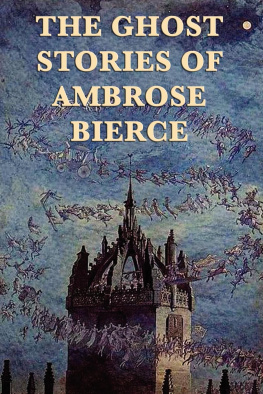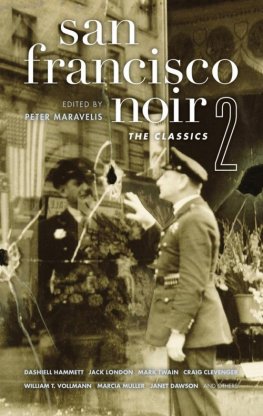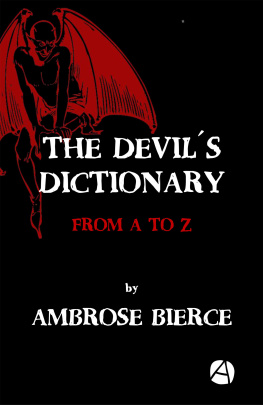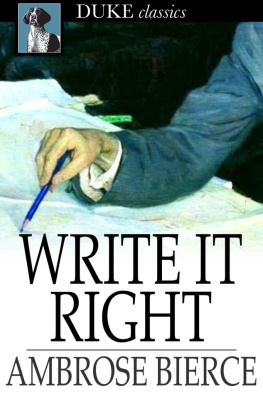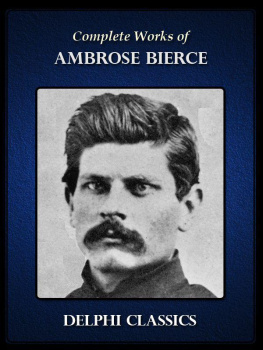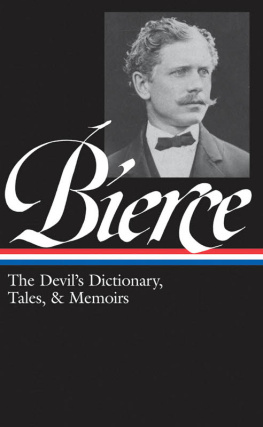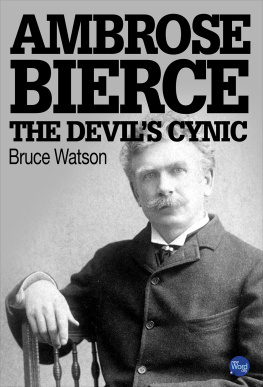The Ghost Stories of Ambrose Bierce
By Ambrose Bierce
Start Publishing LLC
Copyright 2012 by Start Publishing LLC
All rights reserved, including the right to reproduce this book or portions thereof in any form whatsoever.
First Start Publishing eBook edition October 2012
Start Publishing is a registered trademark of Start Publishing LLC
Manufactured in the United States of America
10 9 8 7 6 5 4 3 2 1
ISBN 978-1-62558-256-0
The Ways of Ghosts
My peculiar relation to the writer of the following narratives is such that I must ask the reader to overlook the absence of explanation as to how they came into my possession. Withal, my knowledge of him is so meager that I should rather not undertake to say if he were himself persuaded of the truth of what he relates; certainly such inquiries as I have thought it worth while to set about have not in every instance tended to confirmation of the statements made. Yet his style, for the most part devoid alike of artifice and art, almost baldly simple and direct, seems hardly compatible with the disingenuousness of a merely literary intention; one would call it the manner of one more concerned for the fruits of research than for the flowers of expression. In transcribing his notes and fortifying their claim to attention by giving them something of an orderly arrangement, I have conscientiously refrained from embellishing them with such small ornaments of diction as I may have felt myself able to bestow, which would not only have been impertinent, even if pleasing, but would have given me a somewhat closer relation to the work than I should care to have and to avow. - A. B.
An Arrest
Having murdered his brother-in-law, Orrin Brower of Kentucky was a fugitive from justice. From the county jail where he had been confined to await his trial he had escaped by knocking down his jailer with an iron bar, robbing him of his keys and, opening the outer door, walking out into the night. The jailer being unarmed, Brower got no weapon with which to defend his recovered liberty. As soon as he was out of the town he had the folly to enter a forest; this was many years ago, when that region was wilder than it is now.
The night was pretty dark, with neither moon nor stars visible, and as Brower had never dwelt thereabout, and knew nothing of the lay of the land, he was, naturally, not long in losing himself. He could not have said if he were getting farther away from the town or going back to it - a most important matter to Orrin Brower. He knew that in either case a posse of citizens with a pack of bloodhounds would soon be on his track and his chance of escape was very slender; but he did not wish to assist in his own pursuit. Even an added hour of freedom was worth having.
Suddenly he emerged from the forest into an old road, and there before him saw, indistinctly, the figure of a man, motionless in the gloom. It was too late to retreat: the fugitive felt that at the first movement back toward the wood he would be, as he afterward explained, filled with buckshot. So the two stood there like trees, Brower nearly suffocated by the activity of his own heart; the other - the emotions of the other are not recorded.
A moment later - it may have been an hour - the moon sailed into a patch of unclouded sky and the hunted man saw that visible embodiment of Law lift an arm and point significantly toward and beyond him. He understood. Turning his back to his captor, he walked submissively away in the direction indicated, looking to neither the right nor the left; hardly daring to breathe, his head and back actually aching with a prophecy of buckshot.
Brower was as courageous a criminal as ever lived to be hanged; that was shown by the conditions of awful personal peril in which he had coolly killed his brother-in-law. It is needless to relate them here; they came out at his trial, and the revelation of his calmness in confronting them came near to saving his neck. But what would you have? - when a brave man is beaten, he submits.
So they pursued their journey jailward along the old road through the woods. Only once did Brower venture a turn of the head: just once, when he was in deep shadow and he knew that the other was in moonlight, he looked backward. His captor was Burton Duff, the jailer, as white as death and bearing upon his brow the livid mark of the iron bar. Orrin Brower had no further curiosity.
Eventually they entered the town, which was all alight, but deserted; only the women and children remained, and they were off the streets. Straight toward the jail the criminal held his way. Straight up to the main entrance he walked, laid his hand upon the knob of the heavy iron door, pushed it open without command, entered and found himself in the presence of a half-dozen armed men. Then he turned. Nobody else entered.
On a table in the corridor lay the dead body of Burton Duff.
A Man with Two Lives
Here is the queer story of David William Duck, related by himself. Duck is an old man living in Aurora, Illinois, where he is universally respected. He is commonly known, however, as Dead Duck.
In the autumn of 1866 I was a private soldier of the Eighteenth Infantry. My company was one of those stationed at Fort Phil Kearney, commanded by Colonel Carrington. The country is more or less familiar with the history of that garrison, particularly with the slaughter by the Sioux of a detachment of eighty-one men and officers - not one escaping - through disobedience of orders by its commander, the brave but reckless Captain Fetterman. When that occurred, I was trying to make my way with important dispatches to Fort C. F. Smith, on the Big Horn. As the country swarmed with hostile Indians, I traveled by night and concealed myself as best I could before daybreak. The better to do so, I went afoot, armed with a Henry rifle and carrying three days rations in my haversack.
For my second place of concealment I chose what seemed in the darkness a narrow caon leading through a range of rocky hills. It contained many large bowlders, detached from the slopes of the hills. Behind one of these, in a clump of sage-brush, I made my bed for the day, and soon fell asleep. It seemed as if I had hardly closed my eyes, though in fact it was near midday, when I was awakened by the report of a rifle, the bullet striking the bowlder just above my body. A band of Indians had trailed me and had me nearly surrounded; the shot had been fired with an execrable aim by a fellow who had caught sight of me from the hillside above. The smoke of his rifle betrayed him, and I was no sooner on my feet than he was off his and rolling down the declivity. Then I ran in a stooping posture, dodging among the clumps of sage-brush in a storm of bullets from invisible enemies. The rascals did not rise and pursue, which I thought rather queer, for they must have known by my trail that they had to deal with only one man. The reason for their inaction was soon made clear. I had not gone a hundred yards before I reached the limit of my run - the head of the gulch which I had mistaken for a caon. It terminated in a concave breast of rock, nearly vertical and destitute of vegetation. In that cul-de-sac I was caught like a bear in a pen. Pursuit was needless; they had only to wait.
They waited. For two days and nights, crouching behind a rock topped with a growth of mesquite, and with the cliff at my back, suffering agonies of thirst and absolutely hopeless of deliverance, I fought the fellows at long range, firing occasionally at the smoke of their rifles, as they did at that of mine. Of course, I did not dare to close my eyes at night, and lack of sleep was a keen torture.
I remember the morning of the third day, which I knew was to be my last. I remember, rather indistinctly, that in my desperation and delirium I sprang out into the open and began firing my repeating rifle without seeing anybody to fire at. And I remember no more of that fight.

